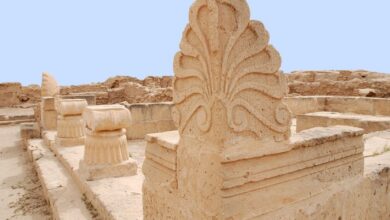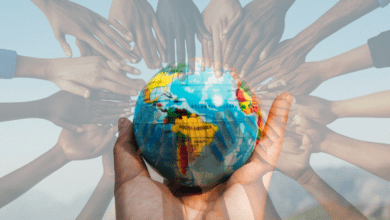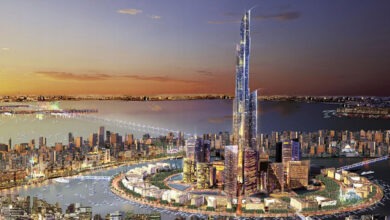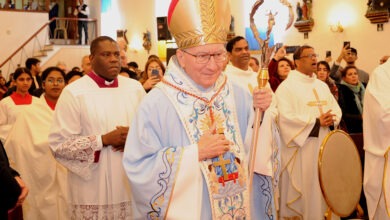Kuwait cannot remain a big oil shop: Dr Saad
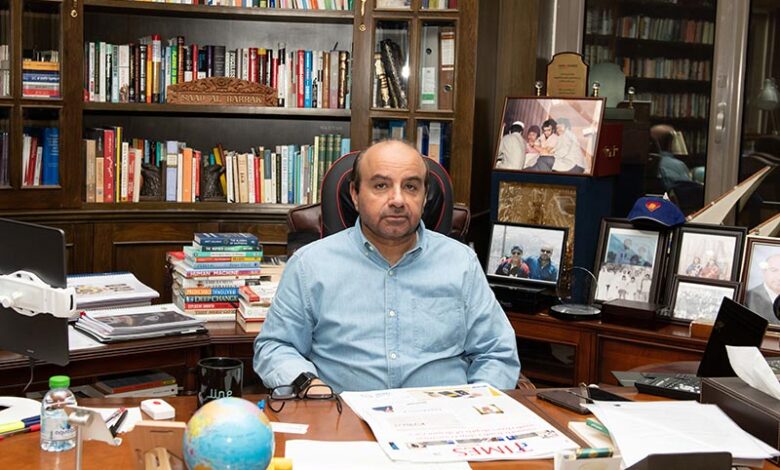
By Reaven D’Souza
Managing Editor
It is a rare opportunity to converse at length with a distinguished personality whose accomplishments speak volumes about him. Dr. Saad Al-Barrak is a living legend in the world of business, and a pioneer as well as prolific catalyst of private enterprise in Kuwait.
In just seven years, from 2002 to 2009, he transformed Kuwait’s ex-state owned telecom operator Mobile Telecommunications Company (MTC), with its customer-base of 500,000 into an international telecom giant, Zain, with over 72 million customers across 23 countries.
Over the same period, revenues leapt from US$400 million to a staggering $8.2 billion. Before joining Zain, Dr. Saad headed International Turnkey Systems (ITS), which had a revenue of $1 million when he joined and over $100 million in revenues when he left the company.
Dr. Saad’s call to be bold, be daring, be different has revolutionised the business models of companies. In an exclusive chat with The Times Kuwait Managing Editor Reaven D’Souza, the former head of Zain shares not only his passion for adventure and taking calculated risks but also reveals the mindset behind his success.
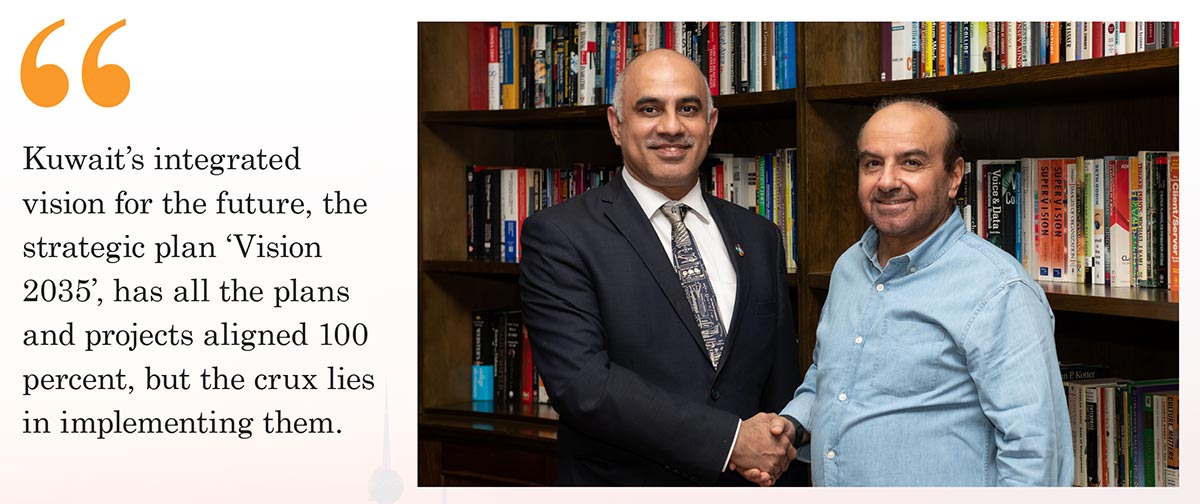
An outspoken intellectual, Dr. Saad does not mince words when he speaks, and it is this clarity of thought and vision that has taken him to the pinnacle of success. He has received many distinguished leadership awards throughout his professional career and in 2009 was even ranked the 20th most influential telecom executive by Global Telecoms Business Magazine.
In his best selling book, A Passion for Adventure, Dr. Saad narrates how he was instrumental in turning around Zain into the telecom giant it became. “If you only move when you are sure, than not sure, then you will do something much less important and much less rewarding,” says Dr. Saad, emphasizing his risk taking philosophy, before adding “the point is, life can only be built by trial and error, and if one develops a passion for adventure then he really becomes an instant learner and grows in every direction, spiritually, morally as well as technically and in knowledge.”
These wise words have been the guiding philosophy of his professional life when he set about conquering unchartered territory and which has seen him gain immense success. “I cherish failure,” he quips, and adds that “failure is great and it is the only school you can learn so much from; one cannot succeed without failure.”
An engineer by profession, Dr. Saad became an entrepreneur by choice. His story is one that every Kuwaiti should be proud of, because his self-made successes come from dedication and diligent work, from venturing across unchartered territories, taking risks and thinking big.
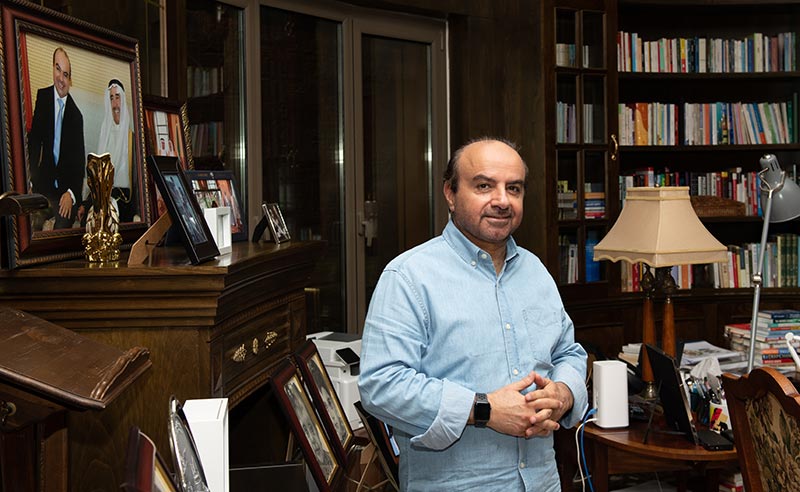
As a first-generation entrepreneur in Kuwait, Dr. Saad may have been a reluctant CEO, but his insatiable thirst for knowledge is something remarkable. He has degrees from various prestigious educational institutes such as Ohio, Harvard and London Universities, but he has never stopped learning.
A firm believer in technology, Dr. Saad is not only passionate about technology but also puts his money in his passion. Since leaving Zain, Dr. Saad has set up ILA (pronounced ELA meaning ‘toward’ in Arabic) and risked all his money for over 10 years before he began reaping its rewards. Today ILA is almost a $1 billion company that focuses on investments in technology related to mobility, big data, artificial intelligence and cloud computing. These four phenomena, he says, will help bring about change and improve lives going forward.
“Technology has evolved rapidly in the last 30 years, data has become mammoth, the rhythm of the world has become faster, transactions have moved to real time,” he says while pointing out that, “game changing software that can cut across several industries will make a difference and improve people’s lives. This is what ILA is all about’.
“Technology investment is risky, one needs to be patient for the results,” he warns while noting that, “at ILA, we invest in small to medium startups, of which four out of five might fail, but one could rise to succeed and go all the way up”.
An optimist to the core, Dr. Saad’s proven track record at ITS and Zain, and now at ILA, make him an ideal candidate to head many projects that need his determination and grit to turn them around. He has consistently declined government job offers because his revolutionary and enterprising mindset does not allow him to be bogged down in a public sector enterprise. However he continues to volunteer his services to government entities. He is vice chairman of the National Fund for Small and Medium Industries Development (SME Fund), and also a member of the Supreme Council of Planning.
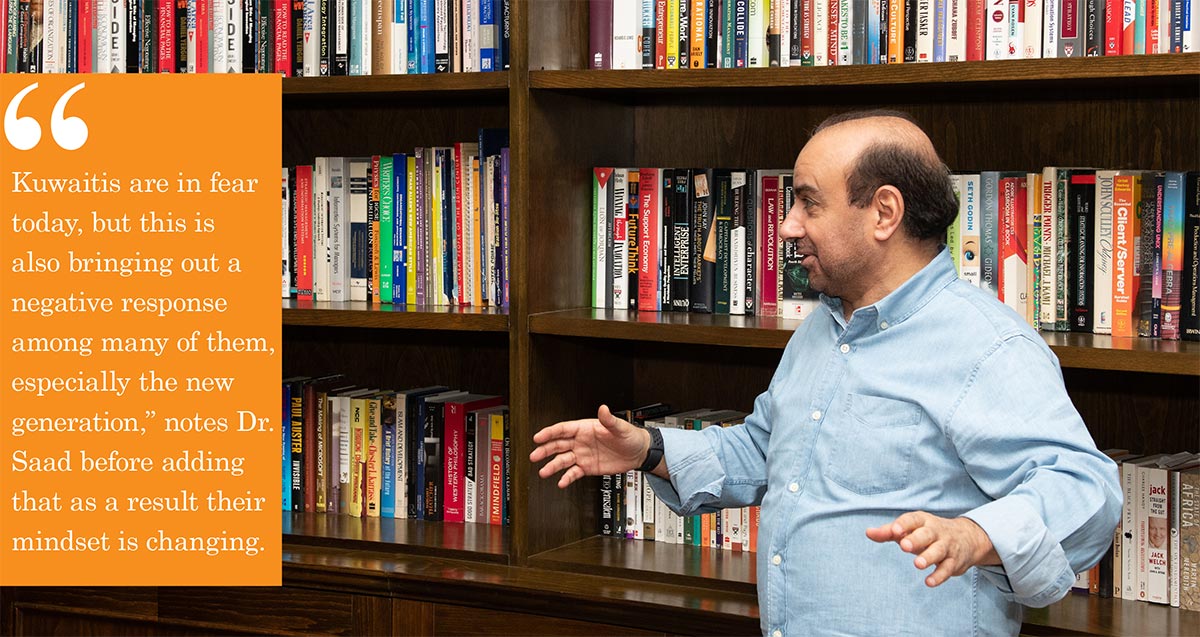
“Kuwaitis today are skilled and we can see that in the 1,500 projects being financed by the SME Fund, of which 25 percent are in technology and industry. There is a lot of innovation and entrepreneurship,” he points out. With a capital of $6.5 billion the Kuwait SME Fund is the largest such fund in the world.
“We have been talking about diversification of our economy for the past 60 years, but nothing has happened,” he says bluntly. “Our boat was rising on the high tide of oil and now when the low tide is in, our boat is stuck. Until we bring in other resources to raise the tide, the boat will never move forward.”
“In general, we need to evolve the functioning of our government; we have a wonderful constitution and great institutions, but unfortunately we tend to govern the old way and remain within our comfort zone,” observes Dr. Saad. “Kuwaitis are still living under the myth that their country is very rich with huge oil reserves and a large sovereign wealth fund. This is short-term thinking; it has to change. We need to think 30-40 years ahead,” he points out.
“Kuwait’s integrated vision for the future, the strategic plan ‘Vision 2035’, has all the plans and projects aligned 100 percent, but the crux lies in implementing them.” Underlining that implementation of the projects has been slow, mainly due to the status of the government today, Dr. Saad adds, “Hopefully, this will change over time and everyone will come together to aggressively pursue this well-designed strategic Vision 2035.”
Even with the slow pace of change he is optimistic that things will change because “things have to change”, he says, pointing to the state of Kuwait’s economy which is “a great balance sheet but with no cash flow”.
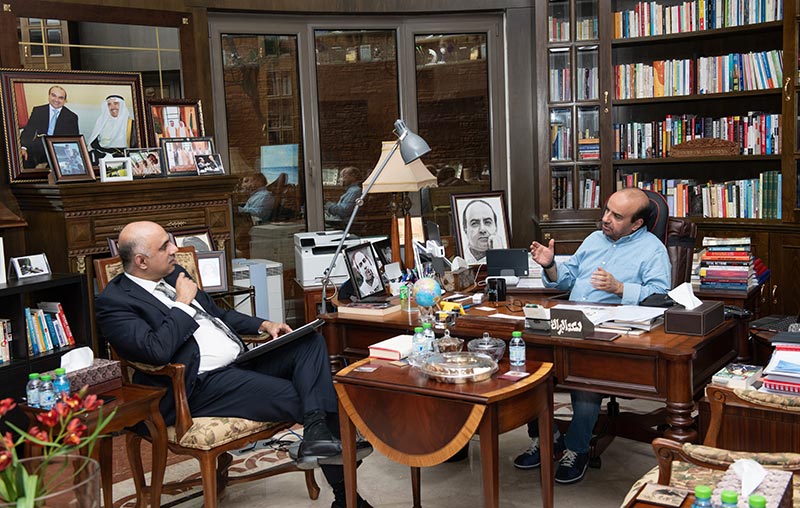
“Fear propels people to change nearly twenty times more often than from need or greed; if you are satisfied and relaxed you hardly move. But if you are where Kuwait is now, we have no other option before us than to change, and to move faster and more assertively,” he reiterates.
“Kuwaitis are in fear today, but this is also bringing out a negative response among many of them, especially the new generation,” notes Dr. Saad before adding that as a result their mindset is changing. “New graduates have to wait between 2 to 3 years for a job, their lifestyle and demands are much higher than earlier generations, these young people are transforming into a negative political power.” Reiterating that change is imminent, he warns, “Fear not aligned with hope is often destructive.”
Regarding the way forward, Dr. Saad says, “A lot of the planning work and the vision are already in place, we should form partnerships and make alliances with world renowned countries as part of the diversification and restructuring process. “Kuwait cannot stay a Big Oil Shop, that is over,” he stresses.
“Our real aim should be to become an energy-skilled country not an oil country,” We should transform to become one of the greatest platforms for energy development — electric, wind, solar, all renewable, sustainable, green energy and efficient. We can use our large financial resources to really develop a line that can support the whole world and we have the capabilities to do that. The economic fundamentals will be drastically changed as the country moves forward in this direction,” he says.
“In the northern economic Zone, we have several great natural assets called islands. We are probably the only country not making use of our natural assets, except for oil. We should be developing these assets as a free zone and venturing forward boldly, with a passion for adventure and risk-taking,” he suggests.
Dr. Saad is often credited for taking Kuwaiti businesses global. He broke the glass ceiling of businesses remaining confined to Kuwait’s borders. At one point, Zain was operating in 23 countries with 99 nationalities on its payroll and it was even referred to as the “Empire of Zain”. Shrugging off this reference, Dr. Saad modestly says that he was only at the right place at the right time. It was the start of the golden age of mobile telecommunications, hence it was the synergy between the two that created the success.
He says that many family-owned businesses start to fade by the second-generation of the family, but here in the Arab world it fades in the first-generation. While they appear to be held together, in reality, the business is already in the process of degeneration. He attributes this mainly to the luxury we live in, to the pampered culture that makes life easy, but which makes the business non-robust. “If the business does not fight tooth and nail to win the business either dies or becomes sick,” he opines.
Pointing out that Kuwaiti businesses are protected through monopoly’s, dealerships and agencies, he calls them “a parasitic model of business that has to evolve through either partnerships or as publicly traded entities, so as to grow, remain competitive and sustainable.
Elaborating on the telecommunication industry, Dr. Saad feels big data, artificial intelligence and cloud computing are the future. Information Technology has become a core part for business in many industries, it is no longer just in a support role for business.
“Because telecom companies sat in their comfort zones during the golden age for mobile operators, collecting huge margins from selling electro-magnetic waves, and they did not evolve their business model or add value to their businesses, they have now become pressed for margins and are not able to evolve into the new world.”
“During my last two years in Zain we started work on the new age to change into a digital services company, unfortunately this was never pursued and after the bonanza of the golden age it is now struggling. It takes a new mindset or rather a revolutionary mindset to take the company to the next level,” he says.
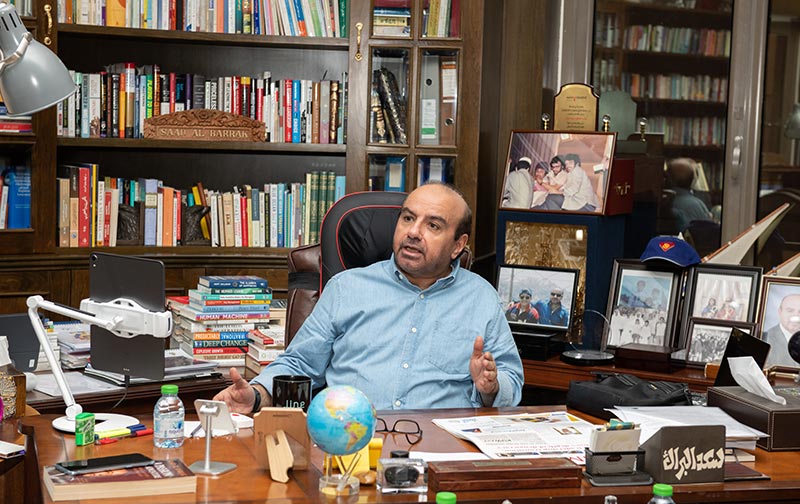
Dr Saad’s leadership role is well recognised and appreciated; all through his career he has been a revolutionary business leader evolving ideas and creating new paths rather than just being a business operator. Commenting on the new 5G technology, he says that this is just another speed. “Over the centuries, people always viewed technology with suspicion, so it is nothing new to be reluctant to embrace a new technology when it appears.” Clarifying that it is not just about the speed, he adds that most telecom companies also cannot leverage the speed of 5G because they are not prepared for it.
Giving an analogy on the response of some companies to the changing telecommunication landscape, he says, “Earlier, companies had an army that could conquer open lands, but now they are confronted with having to fight in jungles and mountains, and many have been found wanting, and as a result their margins have been falling.” He attributes some of the blame to the government, who he says got greedy and spoiled the market. The licencing tariffs and over regulation had also deeply impacted the investment into the telecom sector.
As much as he believes in technology, he also adds that the critical part is the human being, it is not just the technology. “The human mind is unlimited but their creation will always be limited,” he points out. Noting that Artificial Intelligence (AI) will make us so much more productive and that one should not fear but rather embrace this technology, he adds, “AI does not control the brain, rather the brain controls it, but unless we free ourselves from this fear we cannot move forward.”
Dr. Saad’s story of climbing to the top echelons of decision making, both in the business and political world, is one of immense pride and fortitude. As a young boy who lost his father early in life, he was brought up by his brother.
“I responded to being an orphan by taking on the challenge and fighting harder in life in a positive way,” he explains. “Many people become indifferent or cast themselves to the side when they feel impacted by life. But we need to remember that a bullet that does not kill you makes you stronger; that has been my experience in life,” says Dr. Saad at the conclusion of his very interesting and informative chat.







